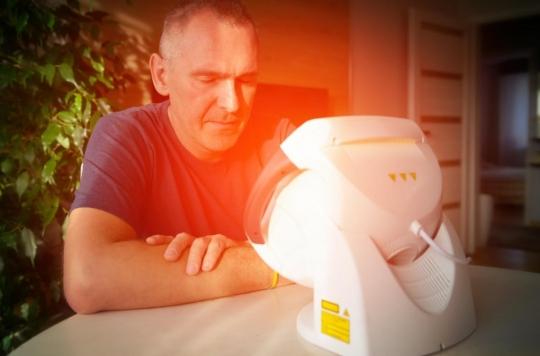Chinese researchers have carried out an inventory of data on this therapeutic tool. According to their conclusions, this technique has significant potential in the treatment of pathologies such as Alzheimer’s or Parkinson’s disease.

- Light therapy restores memory and cognitive abilities
- Circadian rhythm disturbances may be at the root of neurodegenerative diseases
Light is essential to our health: it helps to improve our mood, regulates our sleep, helps maintain our immune defences. For several years, scientists have been interested in the benefits of light therapy on specific pathologies. A study of Chinese Medical Journal identified all the data collected on its effectiveness in the management of neurodegenerative diseases. “Studies have been conducted on the effects of light therapy on mental and sleep disordersexplains Dr. Chun-Feng Liu, lead author of this meta-analysis, but knowledge is lacking on its application in the treatment of neurodegenerative diseases.”
What effects on neurodegenerative diseases?
Light therapy involves using light as a treatment either by recommending controlled exposure to natural light, or by using artificial light with specific wavelengths. In the case of Alzheimer’s disease, researchers note that its use can restore memory and cognitive abilities, improve the quality and duration of sleep. Living in bright places would also reduce the aggressiveness and anxiety of patients with dementia. For Parkinson’s disease, light therapy acts on non-motor symptoms such as insomnia, depression or fatigue. “Study of the use of light therapy in other neurodegenerative disorders is still in the pre-clinical stage“, specify the researchers. They emphasize however that it is a risk-free and profitable technique for the management of neurodegenerative pathologies.
An action on the circadian rhythm
Light therapy acts on one of the main regulators of our body: the circadian rhythm, characterized by diurnal and nocturnal periods. In our brain, the hypothalamus, houses a kind of clock that regulates it. The latter works thanks to different genes, in case of dysfunction, the circadian rhythm is disturbed and this can cause neurodegenerative diseases. A hormonal imbalance can also be the cause, because the secretion of melatonin is also part of the regulators of our circadian rhythm. Light therapy can act on both of these factors and thus help restore balance.
An increase in the number of cases
Neurodegenerative diseases are considered frequent by Public Health France. Alzheimer’s disease and various forms of dementia affect more than one million people in the country, Parkinson’s disease affects more than 160,000.”Due to the progressive aging of the population and the lack of curative treatments, the number of people suffering from neurodegenerative diseases has increased considerably over the past decades and is expected to grow steadily in the years to come.“, specifies the organization.
















